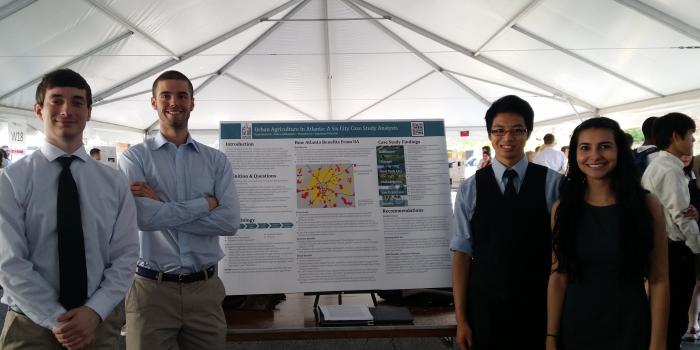By: Sahra Jabbehdari, Ryan Hedrich, Jonathan Vallecillo, and Tim Lin

Across the United States, urban food production and its supporting policies have yielded multiple benefits for host cities such as the promotion of human health, encouragement of civic virtue, development of economic opportunities, and protection of the environment. The Atlanta Local Food Initiative (ALFI), a coalition of local stakeholders active in Atlanta’s urban agriculture movement, was formed in response to the increasing demand for a more sustainable local food system for Atlanta. The efforts of our policy task force have been targeted at analyzing how several prominent cities in the U.S. have already approached urban agricultural phenomena. Such an analysis makes possible an extraction of best practices which create a framework ALFI can use to inform Atlanta’s policy makers about policies that would promote sustainable urban agriculture. We have operationalized this goal through case studies of urban agriculture programs and infrastructures in Baltimore, Chicago, New York City, Philadelphia, Seattle, and San Francisco.
The cities we investigated primarily found success in their urban agriculture programs (UA) through public enterprises: subsidies, incentives, as well as city-funded community garden/urban farm initiatives. In cities similar to Atlanta, seeing growth in community support alone may not be enough momentum to beget a prominent UA environment. Baltimore and Seattle offer incentives for Supplemental Nutrition Assistance Program (SNAP) beneficiaries which allow for purchases at farmers’ markets matched up to $10. These programs boosted SNAP spending at farmers’ markets by tens of thousands of dollars, ultimately increasing healthy food consumption by lower-income populations who have otherwise had difficulties meeting recommended consumption levels of fruits and vegetables. This highlights only one of the benefits yet to be reaped by expanding allowances for urban food production within the City of Atlanta.
The City of Atlanta has the potential to allow for and encourage urban food production, improving inefficient use of the city’s vacant lots to be used as local restaurant gardens, community gardens and farms, and school gardens. School gardens in particular are success stories in Baltimore, New York City, and San Francisco, each devoting city green space to increase civic engagement from neighborhoods, students, parents, and other partners of the schools. Baltimore, for example, provided a grant to address the problematic rate of overweight students in their high schools. And by taking advantage of the city’s vacant lots, San Francisco saves an estimated $4,100 a year per site in maintenance costs by using these sites for urban agriculture.
These endeavors are expensive, so the successes of these cities can only be accomplished through a sizeable effort by the city. While the rise in networking of local stakeholders is an important start, it is the partnering of these organizations with the governments of their respective municipalities that yields the greatest return for the cities and their citizens. Success in urban food production begins with allowances for urban agriculture in the city’s zoning ordinances. As the city strives to meet this goal, it should look to garnering monetary support through grants and other sources of funding to truly support the potential of Atlanta’s urban agriculture system and local initiatives.
